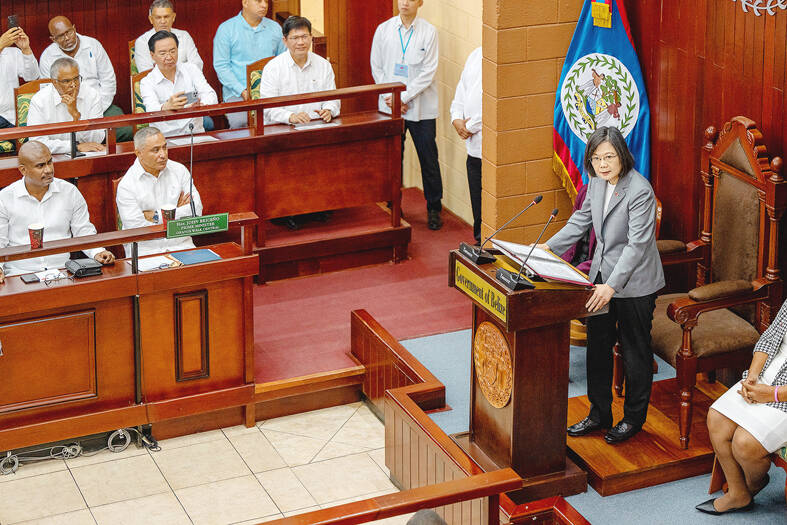The friendship between Taiwan and Belize is not built on empty promises or the political whims of their leadership, but on shared values, President Tsai Ing-wen (蔡英文) told the Belizean National Assembly on Monday.
Tsai was invited to deliver an address before the assembly by Belizean Prime Minister John Briceno, House of Representatives Speaker Valerie Woods and Senate President Carolyn Trench-Sandiford.
“What our two countries share is the strength and courage to rise from our challenging past and make our present and future free, bright and prosperous,” she said, adding that she was delighted to visit the country again after her trip five years ago.

Photo: EPA-EFE / Presidential Office
She singled out “expansionist threats from authoritarian regimes” as the greatest challenge faced by both sides in the post-COVID-19 pandemic era, alongside climate change, a global economic slowdown and inflation.
While Taiwan’s relationships with democratic partners around the world have grown closer in recent years, the nation is facing constant threats from China and continues to be excluded from participation in international organizations, she said.
She thanked Belize for being “Taiwan’s strongest and most powerful advocate for our international participation” by voicing support for the nation at international forums and meetings held by global organizations, including the UN, the WHO, the International Civil Aviation Organization and the UN Framework Convention on Climate Change.
Members of the Belizean National Assembly unanimously passed a motion to support Taiwan’s participation in international organizations in May last year and the Resolution to Support Democratic Taiwan Motion last month, she said.
“Your unwavering friendship and support mean so much to us,” Tsai said.
Taiwan is honored to help Belize with development projects, such as road infrastructure, clean water supply for rural areas and providing nutritious food and Internet access to schools, she said.
The joint Women’s Empowerment Project has so far directly assisted more than 700 local women through vocational training and financial support, while scholarships from Taiwan have brought 500 Belizean students to study in Taiwan, she added.
Taiwan is Belize’s 10th-largest trading partner, with exports from the Central American nation to Taiwan last year skyrocketing 317 percent from 2021 after the Taiwan-Belize Economic Cooperation Agreement took effect in January last year, she said.
Companies from the two countries signed a letter of intent to import US$2 million of Belizean lobsters, and the government is working to facilitate and accelerate imports of other products from Belize, she said.
“Both our countries’ success is a testament to what courage, hard work, determination and diligence can achieve,” she said.
Despite some countries’ attempts to destroy their friendship, Taiwan and Belize remain close as they share common values and the vision for a more prosperous and peaceful future, she said.
The president said that the visit to Belize “solidified my confidence that our relationship will continue to stand strong for decades to come.”

MORE VISITORS: The Tourism Administration said that it is seeing positive prospects in its efforts to expand the tourism market in North America and Europe Taiwan has been ranked as the cheapest place in the world to travel to this year, based on a list recommended by NerdWallet. The San Francisco-based personal finance company said that Taiwan topped the list of 16 nations it chose for budget travelers because US tourists do not need visas and travelers can easily have a good meal for less than US$10. A bus ride in Taipei costs just under US$0.50, while subway rides start at US$0.60, the firm said, adding that public transportation in Taiwan is easy to navigate. The firm also called Taiwan a “food lover’s paradise,” citing inexpensive breakfast stalls

TRADE: A mandatory declaration of origin for manufactured goods bound for the US is to take effect on May 7 to block China from exploiting Taiwan’s trade channels All products manufactured in Taiwan and exported to the US must include a signed declaration of origin starting on May 7, the Bureau of Foreign Trade announced yesterday. US President Donald Trump on April 2 imposed a 32 percent tariff on imports from Taiwan, but one week later announced a 90-day pause on its implementation. However, a universal 10 percent tariff was immediately applied to most imports from around the world. On April 12, the Trump administration further exempted computers, smartphones and semiconductors from the new tariffs. In response, President William Lai’s (賴清德) administration has introduced a series of countermeasures to support affected

CROSS-STRAIT: The vast majority of Taiwanese support maintaining the ‘status quo,’ while concern is rising about Beijing’s influence operations More than eight out of 10 Taiwanese reject Beijing’s “one country, two systems” framework for cross-strait relations, according to a survey released by the Mainland Affairs Council (MAC) on Thursday. The MAC’s latest quarterly survey found that 84.4 percent of respondents opposed Beijing’s “one country, two systems” formula for handling cross-strait relations — a figure consistent with past polling. Over the past three years, opposition to the framework has remained high, ranging from a low of 83.6 percent in April 2023 to a peak of 89.6 percent in April last year. In the most recent poll, 82.5 percent also rejected China’s

PLUGGING HOLES: The amendments would bring the legislation in line with systems found in other countries such as Japan and the US, Legislator Chen Kuan-ting said Democratic Progressive Party (DPP) Legislator Chen Kuan-ting (陳冠廷) has proposed amending national security legislation amid a spate of espionage cases. Potential gaps in security vetting procedures for personnel with access to sensitive information prompted him to propose the amendments, which would introduce changes to Article 14 of the Classified National Security Information Protection Act (國家機密保護法), Chen said yesterday. The proposal, which aims to enhance interagency vetting procedures and reduce the risk of classified information leaks, would establish a comprehensive security clearance system in Taiwan, he said. The amendment would require character and loyalty checks for civil servants and intelligence personnel prior to